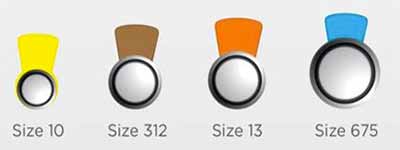AAA or 675? Understanding Hearing Aid Batteries
The batteries used by your hearing aids are much different than the ones you are used to putting in your smoke detectors and remote controls. Understanding what makes these batteries different is essential for proper hearing aid care. Below are some common questions many Portlanders ask their audiologist when they first get their hearing aids.
What kinds of batteries do hearing aids use?

Most hearing aids use disposable zinc-air batteries that are color- and number-coded for easy replacement. The type of battery needed depends on the style and size of your hearing aids and includes: 5 (red), 10 (yellow), 13 (orange), 312 (brown) and 675 (blue). Most pharmacies carry replacement batteries. You can also purchase them from your Portland audiologist’s office.
How do zinc-air batteries differ from other battery types?
Zinc-air batteries require oxygen to produce power. They come with a protective seal on the back; once this is removed, oxygen enters through tiny holes to activate them. You should wait at least a minute before inserting your batteries to ensure they have absorbed enough oxygen in order to work properly.
How long will hearing aid batteries last?
On average, batteries last five to seven days depending on the size and style of your hearing aids, your degree of hearing loss, the amount of time your hearing aids are used and your listening environment.
How do I know when it’s time to change the batteries?
Obviously if there is no sound coming through your hearing aids, your first suspicion should be a dead battery. Other signs include sound that is distorted or unclear and unusually low volume levels. Some hearing aids are designed to produce an audible tone warning you when batteries are low.
Are there steps I can take to extend battery life?
Store your batteries at room temperature and avoid exposing them to moist or humid environments. This includes the refrigerator – despite what you may have heard, this is not a good place to keep your batteries as temperature extremes and condensation can shorten their life. Keep batteries away from keys, coins and other metal objects that can cause them to short circuit or discharge. When removing your hearing aids, turn them off and open the battery compartment door to prevent excess moisture and battery drain.
This can all be a little overwhelming. Fortunately, your Portland audiologist is only a phone call away.


